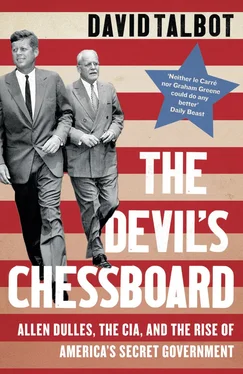1 ...8 9 10 12 13 14 ...45 Foster’s reaction to his friends’ terrible dilemma unnerved his sister. “There’s nothing that a person like me can do in dealing with these men, except probably to keep away from them,” he later told Eleanor. “They’re safer, if I keep away from them.” Actually, there was much that a Wall Street power broker like John Foster Dulles could have done for his endangered friends, starting with pulling strings to get their families and at least some of their assets out of Germany before it was too late.
Throughout her life, Eleanor wrestled with her brothers’ cold, if not cruel, behavior. A family loyalist to the end, she generally tried to give her brothers the most charitable interpretation possible. But sometimes the brothers strained even her sisterly charity. The same year that Foster sidestepped the urgent concerns of his Jewish friends in Berlin, Eleanor informed him that she intended to marry David Blondheim, the man she had been in love with ever since meeting him in Paris in 1925. Blondheim was a balding, middle-aged linguistics professor at Johns Hopkins University—with “ a very sensitive mouth,” in Eleanor’s estimation, “and clear, brown eyes.” He was also a Jew. Eleanor’s parents had given Blondheim their approval, calling him “charming,” after meeting him and Eleanor for dinner during a visit to Paris. But by 1932, Reverend Dulles was dead and Foster was head of the family. And he had a different perspective on the mixed marriage that his sister and her fiancé finally felt brave enough to attempt.
Foster wrote Eleanor a letter, asking her if she realized “the complications of marrying a Jew”—and helpfully pointing out a dozen such problems. Her brother’s letter stunned and infuriatedEleanor, who by then was in her midthirties and not in need of her brother’s counsel in such matters. She promptly replied, but, not wanting to directly defy her imposing brother, she sent the letter to his wife, Janet. In her letter, Eleanor made it clear that Foster need not trouble himself with her life’s “complications” and that, in the future, she would simply “go my own way.”
Years later, Eleanor tried to explain away her brother’s behavior. He was not motivated by anti-Semitism, she insisted. He was just a product of his social and professional milieu. In his circles, she explained, people would say, “ We can’t have too many Jewsin this club” or “We can’t have too many Jews in this firm.” Foster simply saw this attitude as a fact of life, Eleanor observed—“just like the climate.”
In 1934, the fragile Blondheim, distressed by the growing cataclysm in Europe and private demons, sunk into depression and killed himself, sticking his head into the kitchen oven. Reasserting himself as paterfamilias, Foster swept back into the deeply shaken life of his sister and took charge. The suicide must, of course, be hushed up. And Eleanor must instantly shed the dead man’s name, or she would be haunted by it in years to come. Eleanor dutifully complied with Foster’s direction and the name Blondheim was purged from the Dulles family record, as if the brilliant man with the sensitive mouth and clear, brown eyes had never existed. The fact she was about to give birth to Blondheim’s son was a bond that Foster could never make disappear.
In early June 1939, the German transatlantic ocean liner St. Louis cruised slowly up the coastline of Florida. The ship, carrying more than nine hundred Jewish refugees from Europe, had been turned away from its original destination, Havana, after days of increasingly frantic negotiations with the Cuban government. Now the black-and-white ocean liner, towering eight decks high and flying a swastika flag, had become a ghost ship, with dimming hopes of finding a safe harbor. While the ship was anchored in Havana Harbor, relatives of the St. Louis passengers crowded onto motorboats and circled the ocean liner, desperately crying out to their loved ones. As the tension-filled days went by, one passenger grew more and more agitated, convinced that he was about to be seized by Gestapo agents on board and bundled off to a concentration camp. He slashed his wrists and jumped into the harbor, where he was rescued and sent to a hospital. He was one of the few allowed to stay in Cuba.
As St. Louis captain Gustav Schroeder guided his ship along the Florida shore, his passengers could see the sparkling lights of Miami in the near distance. Schroeder had ordered his German crew to treat the refugees just like any other passengers. While the ocean liner had steamed across the Atlantic from Hamburg, the captain asked his stewards to serve ice cream to the children and to play movies in the evening. But after the ship was turned away from Havana—where Nazi agents had stirred up anti-Semitic feelings among the local population and demagogues had fanned fears that the Jews would steal jobs that were ever scarcer in the declining economy—the festive mood on board the St. Louis had quickly dissipated. Now Captain Schroeder hugged the U.S. coastline in the dim hope that the Roosevelt administration would come to his passengers’ rescue.
The doomed voyage of the St. Louis would become a symbol of the Jewish people’s terrible predicament. While the ship plowed the seas with its human cargo, the governments of the world—from Washington, D.C., to London to Buenos Aires—debated its fate. In Washington, FDR’s Treasury secretary, Henry Morgenthau Jr., maneuvered strenuously to win permission for the ship to dock in an American port. Morgenthau, who had established himself as the conscience of the administration on the Jewish refugee crisis, dispatched U.S. Coast Guard ships to follow the St. Louis as it journeyed north along the Eastern Seaboard, so he could keep track of the ghost vessel in case the government allowed it to land.
Morgenthau was so integrala member of Roosevelt’s inner circle that he was known as “the assistant president.” He was of German Jewish ancestry and Democratic Party royalty. His father, New York real estate mogul Henry Morgenthau Sr., had been one of President Woodrow Wilson’s major financial backers and served as Wilson’s ambassador to the Ottoman Empire. Henry Jr., who ran a Hudson Valley farm near the Roosevelt family’s Hyde Park estate, would develop a long personal and political relationship with FDR. When Franklin’s privileged life was suddenly turned upside down by the ravages of polio, Morgenthau was one of the few political advisers who remained close to him, keeping his spirits up with games of Parcheesi.
After he was elected to the White House in 1932, Roosevelt—who was the first presidentialcandidate to campaign against anti-Semitism—appointed Morgenthau and several other Jews to prominent positions in his administration. Fifteen percent of FDR’s top appointees were Jewish, at a time when Jews represented less than 3 percent of the population. Bigoted enemies of the New Deal enjoyed a ditty about Franklin and First Lady Eleanor—who was known as a champion of African American civil rights—that went, “You kiss the niggers?/?and I’ll kiss the Jews?/?and we’ll stay in the White House?/?as long as we choose.” There were even rumors that Roosevelt himself was Jewish.
Morgenthau was acutely sensitive about the anti-Jewish sentiments that prevailed in the country, not least in the nation’s capital, where private clubs would restrict membership to white Christians until well into the 1960s. And despite his wealth, political status, and deep history with the president, he always remained somewhat insecure with Roosevelt, who was not immune to some of the prejudices of his day. Looking back on his long service with the president, Morgenthau later said, “ He never let anybody aroundhim have complete assurance that he would have a job tomorrow … The thing that Roosevelt prided himself the most about was, ‘I have to have a happy ship.’ But he never had a happy ship.”
Читать дальше











